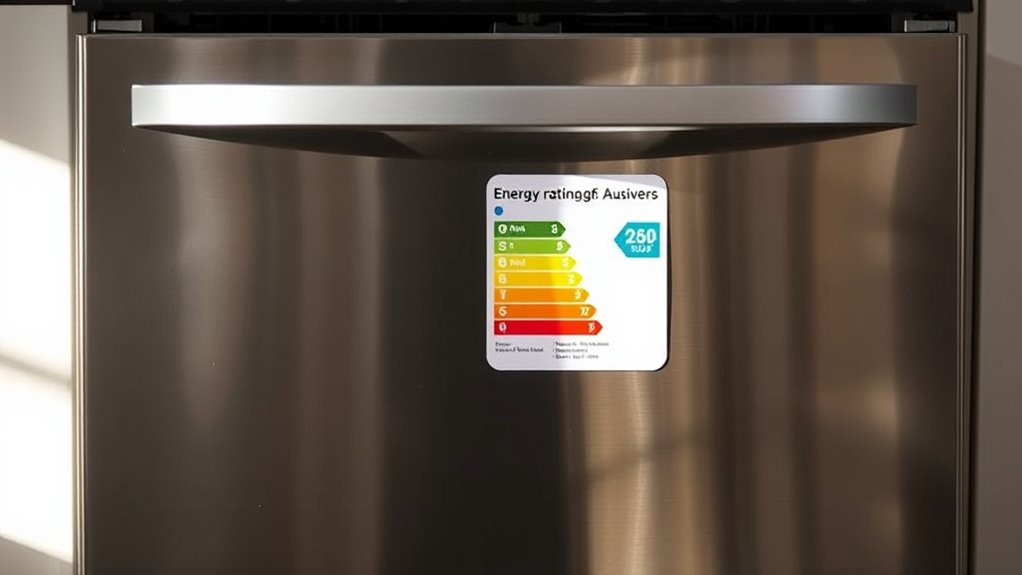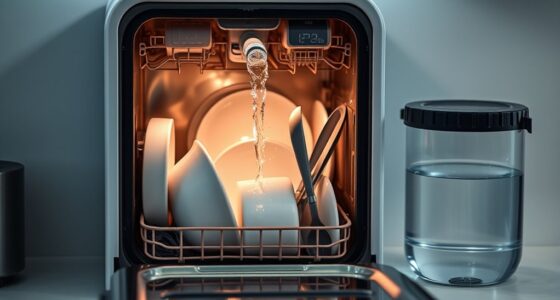Understanding energy ratings on portable dishwashers helps you compare models based on their efficiency, typically shown through star ratings or kWh per cycle. A lower kWh indicates less energy use, which can save you money and reduce environmental impact. These ratings also reflect how well the appliance balances performance with energy consumption. If you want to learn more about how to choose the most efficient dishwasher for your needs, keep exploring the details.
Key Takeaways
- Energy ratings typically use star systems or efficiency scores indicating how well a dishwasher converts electricity into cleaning power.
- Lower kWh per cycle values mean the dishwasher uses less energy, highlighting better energy efficiency.
- Higher efficiency ratings reduce electricity bills and environmental impact by consuming less power per load.
- Factors like water use, cycle options, and size influence the overall efficiency beyond just energy ratings.
- Choosing a smaller, high-efficiency portable dishwasher can provide savings and environmental benefits over time.

Have you ever wondered what those energy ratings on portable dishwashers really mean? It’s a common question, especially when you’re trying to choose a model that balances performance with your energy bill. These ratings are designed to give you a quick snapshot of how efficiently a dishwasher uses energy, but understanding what they actually represent can help you make smarter decisions. At the core, energy efficiency measures how well the dishwasher converts electricity into cleaning power without wasting it. A highly energy-efficient model consumes less power to complete each wash cycle, which directly impacts your monthly electricity bill. Conversely, a model with high power consumption might seem appealing because it promises faster or more thorough cleaning, but it can considerably increase your energy costs over time.
When you look at the energy rating label, you’ll notice it often includes a star system or an efficiency score. Generally, the more stars a dishwasher has, the better its energy efficiency. This means it uses less electricity for the same cleaning performance, saving you money in the long run. Power consumption figures are also listed, usually measured in kilowatt-hours (kWh) per cycle. This number indicates exactly how much energy the dishwasher uses to complete one wash cycle. A lower kWh rating signifies less energy used per load, which is ideal if you’re trying to reduce your environmental impact or lower your utility bills. Keep in mind that these ratings aren’t just about saving money; they also reflect how environmentally friendly the appliance is. More efficient dishwashers contribute less to greenhouse gas emissions because they require less energy production.
It’s worth noting that the energy rating doesn’t tell the entire story on its own. Factors like water consumption, cycle options, and the dishwasher’s size all play a role in its overall efficiency. For example, a smaller portable dishwasher with a high energy efficiency rating might be a better fit for your needs than a larger, less efficient model. You should also consider your typical usage patterns. If you run multiple loads daily, choosing a model with low power consumption can lead to considerable savings over time. Additionally, top mattress toppers can improve sleep quality by providing extra support and comfort during long cycles of rest, similar to how choosing an energy-efficient appliance can benefit overall well-being. On the other hand, if you only wash dishes occasionally, the initial cost difference might outweigh the benefits of higher efficiency.
Frequently Asked Questions
How Do Energy Ratings Impact Overall Dishwasher Performance?
Energy ratings influence your dishwasher’s performance by highlighting efficiency and operational costs. A higher rating often means better load capacity, allowing you to wash more dishes at once, and lower noise levels, making it quieter during use. When choosing a dishwasher, consider these ratings to guarantee you get a model that meets your needs for capacity and quiet operation, ultimately saving energy and enhancing your convenience.
Are Higher Energy Ratings Always More Cost-Effective Long-Term?
Higher energy ratings often mean better energy savings, but they don’t always guarantee long-term cost-effectiveness. You might find a less efficient model with a lower initial cost that still offers good appliance lifespan and savings, especially if usage is moderate. Consider both upfront costs and ongoing energy expenses to determine if a higher-rated dishwasher truly delivers better value over time. Balancing these factors helps you make smarter, cost-effective choices.
What Maintenance Affects a Portable Dishwasher’S Energy Efficiency?
Think of your portable dishwasher as a finely tuned engine; proper maintenance keeps it running smoothly. Regularly check and clean the filters, and avoid overloading. Your detergent choices matter—use efficient, high-quality options. Also, pay attention to water temperature; hotter water cleans better and uses energy efficiently. When you keep these elements in check, your dishwasher performs at its best, saving energy and extending its lifespan.
Do Energy Ratings Vary Between Brands for Similar Models?
When you compare portable dishwashers, you’ll notice that energy ratings can vary between brands, even for similar models. This brand comparison shows that rating consistency isn’t always assured, so it’s smart to check the specific energy efficiency labels. Don’t assume all brands have the same standards—look closely at each model’s rating to ensure you’re choosing the most energy-efficient option for your needs.
How Do Usage Habits Influence a Dishwasher’s Energy Consumption?
Think of your dishwasher like a car; your usage patterns and cycle selection directly impact fuel (energy) use. If you run full loads and choose eco-friendly cycles, you conserve energy. Conversely, frequent small loads or using intensive cycles increase consumption. Your habits matter more than you think—they’re the steering wheel guiding your dishwasher’s efficiency. Adjust your cycle choices and load size to maximize energy savings effortlessly.
Conclusion
Think of energy ratings as your dishwasher’s personal report card, guiding you to make smarter choices. Just like a trusted compass, they steer you toward efficiency and savings, helping your appliance navigate the busy waters of daily use. By understanding these ratings, you become the captain of your energy ship, steering clear of waste and sailing smoothly into a more eco-friendly future. So, keep an eye on those ratings and let your dishwasher lead the way!









